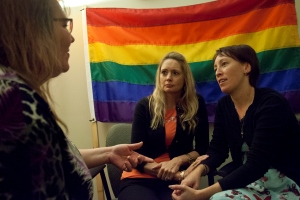For LGBTQ+ individuals, coming out and living authentically can be a challenging and emotional journey. While society has become more accepting of LGBTQ+ identities in recent years, many individuals and their families still face unique challenges related to their identities. Family therapy can offer a safe and inclusive space for LGBTQ+ individuals and their families to address these challenges and build stronger relationships. In this blog, we will explore the benefits of family therapy for LGBTQ individuals and their families and discuss how to find help when needed.
Contents
What Is Family Therapy?
 Family therapy is a form of psychotherapy that focuses on improving communication and resolving conflicts within family systems. It views problems as being influenced by the interactions and dynamics within the family, rather than solely by individuals. The therapist identifies patterns of behavior, explores underlying issues, and develops strategies for change. Its goal is to strengthen relationships within the family unit.
Family therapy is a form of psychotherapy that focuses on improving communication and resolving conflicts within family systems. It views problems as being influenced by the interactions and dynamics within the family, rather than solely by individuals. The therapist identifies patterns of behavior, explores underlying issues, and develops strategies for change. Its goal is to strengthen relationships within the family unit.
Is Family Therapy Available For LGBTQ?
Yes, family therapy is available for LGBTQ+ individuals and their families. Many therapists are trained to work with clients from diverse backgrounds, including those who identify as LGBTQ+. The focus of Family therapy for LGBTQ is on improving relationships and communication within the family system. This is done regardless of sexual orientation or gender identity. Therapists may help family members to navigate societal and cultural challenges, and address any issues related to discrimination or stigma.
When To Seek LGBTQ Family Therapy?
Here are some situations in which it may be helpful to seek family therapy for LGBTQ+ individuals:
- If you or someone in your family is coming out as LGBTQ+. Family therapy can help you navigate this process and provide support for all family members.
- If there is conflict within the family related to LGBTQ+ issues, family therapy can help family members communicate more effectively and work through disagreements in a constructive way.
- If an LGBTQ+ family member is struggling with mental health concerns. Family therapy can help family members learn how to provide effective support and improve overall mental health and well-being.
- If there are issues within a romantic relationship involving an LGBTQ+ individual and their partner(s). Family therapy can help family members support the relationship and learn how to communicate more effectively.
- If an LGBTQ+ family member is transitioning. Family therapy can help family members understand and support the transition process and navigate any challenges that may arise.
Various Techniques Involved
Given below are some techniques involved in the delivery of family therapy for LGBTQ:
Structural family therapy
 This approach focuses on the patterns of behavior and interactions within the family system. The therapist helps the family identify and change patterns of behavior that are causing distress. The therapist may use techniques such as joining, reframing, and boundary setting to promote positive change. For example, the therapist may help the family identify negative communication patterns and teach them more effective communication skills.
This approach focuses on the patterns of behavior and interactions within the family system. The therapist helps the family identify and change patterns of behavior that are causing distress. The therapist may use techniques such as joining, reframing, and boundary setting to promote positive change. For example, the therapist may help the family identify negative communication patterns and teach them more effective communication skills.
Emotionally focused therapy
This approach emphasizes the emotional connections between family members. The therapist helps the family identify and express their emotions safely and constructively. The therapist may use techniques such as empathic listening, validation, and emotion regulation to promote emotional connection and understanding. For example, the therapist may help the family members identify and express their emotions related to a conflict, and teach them how to listen and respond to each other with empathy and understanding.
Narrative therapy
This approach explores the stories and beliefs that shape the family’s identity. The therapist helps the family reframe their stories in a more positive and constructive way. The therapist may use techniques such as externalizing, reauthoring, and unique outcomes to help the family members see their problems in a new light. For example, the therapist may help the family members identify and challenge negative beliefs about themselves or each other, and develop more positive and empowering narratives.
Cognitive-behavioral therapy
This approach helps the family identify and change negative patterns of thought and behavior. The therapist may use techniques such as cognitive restructuring and behavior modification to promote positive change. For example, the therapist may help the family members identify and challenge negative thoughts and beliefs that are contributing to conflict, and teach them more adaptive ways of thinking and responding to each other.
Solution-focused therapy
This approach focuses on finding solutions to specific problems. The therapist helps the family identify their strengths and resources and develop a plan for change. The therapist may use techniques such as scaling questions, miracle questions, and exception-seeking to help the family members envision and work toward their desired outcomes. For example, the therapist may help the family members identify what is already working well in their relationship, and build on those strengths to address the areas of conflict.
Mindfulness-based therapy
 This approach emphasizes being present in the moment and developing awareness of thoughts and emotions. The therapist may use techniques such as meditation and breathing exercises to help the family develop mindfulness skills. The therapist may also help the family members identify and challenge automatic thoughts and emotions that are contributing to conflict.
This approach emphasizes being present in the moment and developing awareness of thoughts and emotions. The therapist may use techniques such as meditation and breathing exercises to help the family develop mindfulness skills. The therapist may also help the family members identify and challenge automatic thoughts and emotions that are contributing to conflict.
Benefits Of Therapy
Family therapy can offer several benefits for LGBTQ+ individuals and their families. Here are some of the benefits:
- Improved communication: Family therapy can help family members communicate more effectively, which can reduce conflict and improve relationships.
- Increased understanding: Family therapy can help family members better understand each other’s perspectives, experiences, and identities.
- Strengthened relationships: Family therapy can help family members build stronger, more supportive relationships and develop more positive patterns of interaction.
- Reduced stress: Family therapy can help reduce stress and improve emotional regulation for both LGBTQ+ individual and their family members.
- Increased resilience: Family therapy can help families develop resilience and coping skills to navigate challenges and overcome adversity.
- Enhanced support: Family therapy can help family members learn how to provide effective support to their LGBTQ+ loved ones and address any unique challenges related to their identity.
- Improved mental health: Family therapy can help LGBTQ+ individuals and their family members improve their mental health and overall well-being.
How To Find Family Therapy For LGBTQ
 Here are some ways to find family therapy for LGBTQ+ individuals:
Here are some ways to find family therapy for LGBTQ+ individuals:
- Referrals: You can ask your primary care physician, mental health provider, or other healthcare professionals for a referral to a family therapist who specializes in working with LGBTQ+ individuals and families.
- Search online: You can search online for family therapists in your area who have experience working with LGBTQ+ individuals and families. Use keywords such as “LGBTQ+ family therapy” or “queer-friendly family therapist” to narrow your search.
- LGBTQ+ organizations: Many LGBTQ+ organizations offer resources and referrals for family therapy. Check with local organizations or national organizations such as the Human Rights Campaign or The Trevor Project for information.
- Insurance provider: Check with your insurance provider to see if they cover family therapy and if they have a list of LGBTQ+ affirming providers.
- Recommendations: Ask friends, family members, or other LGBTQ+ individuals if they know of any family therapists who are knowledgeable and supportive of LGBTQ+ issues.
Conclusion
Family therapy can provide a supportive and inclusive environment for LGBTQ+ individuals and their families to address challenges and build stronger relationships. By improving communication, increasing understanding, and building resilience, family therapy can help families navigate the unique challenges faced by LGBTQ+ individuals. If you or a loved one is experiencing difficulties related to LGBTQ+ issues, seeking the help of a qualified family therapist can provide the support and guidance needed to navigate these challenges and build a stronger, more supportive family system.
For more information, please contact MantraCare. Parenting is a challenging yet rewarding experience that is crucial for the development and well-being of a child. If you have any queries regarding Online Parenting Counseling experienced therapists at MantraCare can help: Book a trial therapy session.


